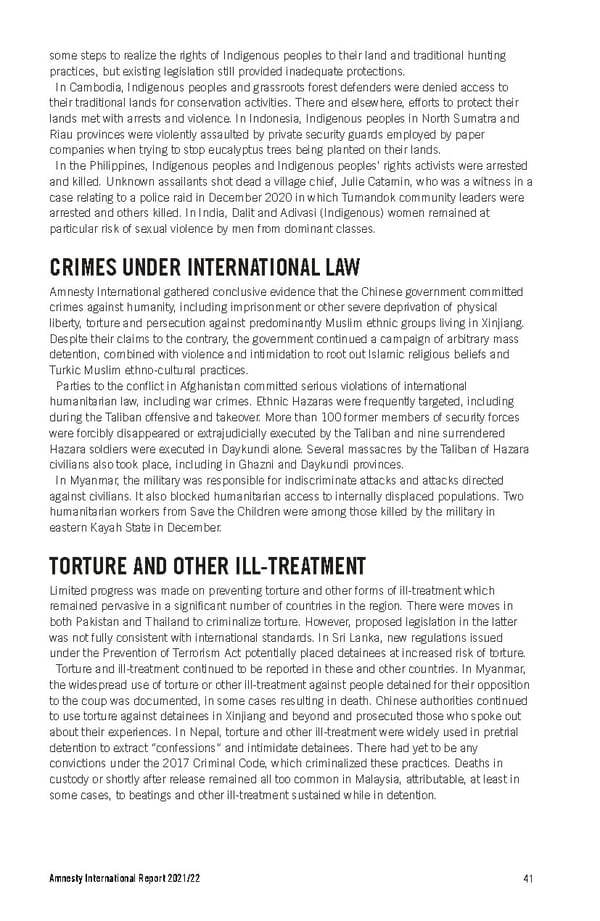some steps to realize the rights of Indigenous peoples to their land and traditional hunting practices, but existing legislation still provided inadequate protections. In Cambodia, Indigenous peoples and grassroots forest defenders were denied access to their traditional lands for conservation activities. There and elsewhere, efforts to protect their lands met with arrests and violence. In Indonesia, Indigenous peoples in North Sumatra and Riau provinces were violently assaulted by private security guards employed by paper companies when trying to stop eucalyptus trees being planted on their lands. In the Philippines, Indigenous peoples and Indigenous peoples’ rights activists were arrested and killed. Unknown assailants shot dead a village chief, Julie Catamin, who was a witness in a case relating to a police raid in December 2020 in which Tumandok community leaders were arrested and others killed. In India, Dalit and Adivasi (Indigenous) women remained at particular risk of sexual violence by men from dominant classes. CRIMES UNDER INTERNATIONAL LAW Amnesty International gathered conclusive evidence that the Chinese government committed crimes against humanity, including imprisonment or other severe deprivation of physical liberty, torture and persecution against predominantly Muslim ethnic groups living in Xinjiang. Despite their claims to the contrary, the government continued a campaign of arbitrary mass detention, combined with violence and intimidation to root out Islamic religious beliefs and Turkic Muslim ethno-cultural practices. Parties to the conflict in Afghanistan committed serious violations of international humanitarian law, including war crimes. Ethnic Hazaras were frequently targeted, including during the Taliban offensive and takeover. More than 100 former members of security forces were forcibly disappeared or extrajudicially executed by the Taliban and nine surrendered Hazara soldiers were executed in Daykundi alone. Several massacres by the Taliban of Hazara civilians also took place, including in Ghazni and Daykundi provinces. In Myanmar, the military was responsible for indiscriminate attacks and attacks directed against civilians. It also blocked humanitarian access to internally displaced populations. Two humanitarian workers from Save the Children were among those killed by the military in eastern Kayah State in December. TORTURE AND OTHER ILL-TREATMENT Limited progress was made on preventing torture and other forms of ill-treatment which remained pervasive in a significant number of countries in the region. There were moves in both Pakistan and Thailand to criminalize torture. However, proposed legislation in the latter was not fully consistent with international standards. In Sri Lanka, new regulations issued under the Prevention of Terrorism Act potentially placed detainees at increased risk of torture. Torture and ill-treatment continued to be reported in these and other countries. In Myanmar, the widespread use of torture or other ill-treatment against people detained for their opposition to the coup was documented, in some cases resulting in death. Chinese authorities continued to use torture against detainees in Xinjiang and beyond and prosecuted those who spoke out about their experiences. In Nepal, torture and other ill-treatment were widely used in pretrial detention to extract “confessions” and intimidate detainees. There had yet to be any convictions under the 2017 Criminal Code, which criminalized these practices. Deaths in custody or shortly after release remained all too common in Malaysia, attributable, at least in some cases, to beatings and other ill-treatment sustained while in detention. Amnesty International Report 2021/22 41
 Amnesty International Report 2021/22 Page 40 Page 42
Amnesty International Report 2021/22 Page 40 Page 42